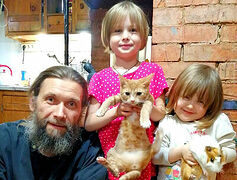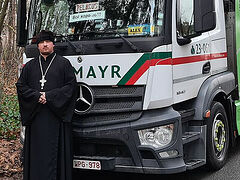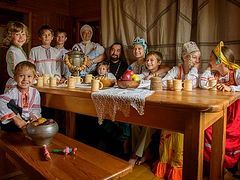From a layman’s perspective, a priest’s wife is a paragon of an Orthodox woman. She should be modest and obedient, a mother with many children, and a great housewife; she should sing and chant at church and be her husband’s right-hand throughout. But how in the world do the priests’ wives live, can they be successful on their own, or should their lives revolve around their families thus depriving and limiting them personally? We attempted to find out by visiting a family of Fr. Artemy Dobrynin and his matushka Kristina.
The Lord gives strength
For the last four years, the village priest and his large family resided in a small ancient village of Privolzhskoye (in Rovensky District) founded by German colonists in the eighteenth century. As the local German settlers were deported during the Great Patriotic War [WWII], settlers from all over Russia moved in to the village, but the Soviets didn’t allow for the Orthodox culture to take root there. The village never had a church and so batiushka currently serves at a former general store adapted to fit the church. Owing to the efforts of Fr. Artemy, matushka, and the faithful, the church, though small, looks cozy and well cared for, surrounded by greenery and flowers.
The village never had a church and batiushka serves at a former general store
Asked whether she, a linguist by education, had any hard feelings about leading the life of a village priest’s wife, Kristina replied with a smile:
“I don’t feel like I’ve underperformed in my life. I’ve got my hands full taking care of the household, the children, teaching at the Sunday school, and overall, helping out at church. I feel it’s enough for me.”
Priest Artemy Dobrynin:
“When I was about to enter a seminary, Archpriest Valery Guensitsky, my spiritual father, told me, ‘If you are ever assigned to serve in the country, you should definitely go and live out there. If you keep your residence in the city and show up occasionally in your village church, your parish will never grow.’
“Judging from my relatively limited experience, I can say that a priest must be immersed in the village life; his kids should go to the local school, and overall the family should go native. My family’s lifestyle is the same as the rest of the villagers, we don’t hide anything, and anyone can stop by for advice or help.”
Matushka Kristina Dobrynina:
“Initially, batiushka used to just come to serve here and only a few among the locals showed up while others were in no rush to join the services, pretending to be busy in their gardens and alluding that a city priest can’t understand the demands of village life. But when we settled here for good and had our farmstead, that’s when they could no longer avert to ifs, ands, or buts. People saw that batiushka is constantly busy either adding on to the church, sawing and cutting something at his home, or taking care of his garden. Their attitude changed.
“When we arrived, our neighbors and parishioners helped us a greatly to get our life in order. They helped us buy a house and later renovate it; a move-in party brought so many guests that we had to set up the long tables in our yard to accommodate them.
 Priest Artemy and Matushka Kristina Dobrynin “Please tell me, do you occasionally crave going back to town and visiting the shopping centers to buy fancy clothes again?”
Priest Artemy and Matushka Kristina Dobrynin “Please tell me, do you occasionally crave going back to town and visiting the shopping centers to buy fancy clothes again?”
“When we decided to move to the country, I gave away all my fancy shoes and other stuff. But time went by and I felt I wanted that back in my life again. Batiushka pampers me; he just bought me a cute bag. But I caught myself thinking: where would I take it? On a run to my chicken coup? Well, it does feel good to own one though! We do have to be in town quite often but it isn’t about shopping, rather more about visiting doctors. The villages are short of medical specialists—there’s neither a pediatrician nor a dentist here. But the Lord is merciful, His help during medical emergencies is almost palpable.”
“Can any woman be a matushka and carry this cross?”
“I never thought that being a matushka is about bearing a special kind of a cross. We are just like any other Christian family. I don’t think a priest’s wife has a position differing from any other Orthodox woman. I doubt it’s more challenging than being a military spouse.
“I always loved to move around, so I never feared that it will be too hard or I won’t be able to work my way through it here. Many people say that having a lot of children is a heavy burden, a podvig, a heroic deed. I never thought about motherhood this way. I just heard another mom with a large family saying that her life is based solely on optimism. It seems to be the same with us, except that we know the source: It is the Lord Who gives us strength.
“When I was a teenager, I used to pray to the Lord to allow me to spend my life near the Church. My prayers were answered. I even met my future husband at church, even if I wasn’t thinking at a time that I would become a village priest’s wife. I married a famous athelete.”
“But why not?”
Fr. Artemy grew up in Marx and played basketball at a professional basketball team called “Avtodor.” His promising career in sports was on the rise, but by the time he was twenty, serious questions about the meaning of life came up in the young man’s head. It seemed he had a life full to the brim, but something really important was missing.
It seemed he had a life full to the brim, but something really important was missing
“That’s when I grew interested in a church life and sought God, but when I opened the Gospels, the words of the Savior struck deep into my heart, shaking it to the core and causing a quiet storm,” Fr. Artemy recalls. “When I finally made up my mind to come to confession, I showed up in my workout suit and stood there mumbling something, unable to put even two words together and feeling completely clueless. Fr. Valery Guensitsky, rector of St. Andrew Church, told me afterward: “You should come by again!” Since then I never missed a service, started helping out as a sacristan and learned to chant. Later on, I found myself thinking about becoming a priest and studying in a seminary. I told Vladyka about it and he supported my decision. In 2012, Kristina and I got married, a year later I entered a seminary and was ordained a deacon. In 2015, I became a priest.”
As a country priest, he serves at three village parishes, the one in Privolzhsky village being the largest. As Vladyka Pachomius remarked recently, these parishes have seen their church life rebound nicely with various events and activities. The church united people and filled their lives with joy.
Priest Artemy Dobrynin:
“We reside in a picturesque steppe region; our village is located next to the pine forest with lots of places to pick mushrooms, and fishing is good here. I wouldn’t trade it for the life back in the city.”
Matushka Kristina Dobrynina:
“I read somewhere that when you are leading a busy social life you cultivate character, whereas a solitary life trains your soul. Maybe the spiritual life in a village is spent differently from that in a busy town. You spend more time alone and pray more often.”
 “But you have kids and your job is to raise and educate them! What can they receive if they live in a village?”
“But you have kids and your job is to raise and educate them! What can they receive if they live in a village?”
“It’s true. There are practically no amenities for children in the village. But we found a way, and do everything we can to educate our children ourselves. It is, first and foremost, our Sunday school; we also have plans to start a chess club and build a playground. In the meantime, batiushka and I are learning to play traditional musical instruments such as the accordion and balalaika, as well as the guitar. We would like our children to learn traditional music, and have it resound in our home.”
“Is it ever possible to learn how to play instruments on your own?”
Priest Artemy Dobrynin:
“Nothing is impossible and we can learn anything given the will. The village life lacks cultural activities and we need professionals, but there are none. I remember how I came to take over the parish and the church windowsills were lined with rows of glass jars full of homemade kvass [a traditional fermented drink.—Trans.] and kombucha. I asked, “Why is this here?” And got this in response: “Why not?” I explained, “The church should be fragrant with burning incense and not reeking of kvass.” The church building didn’t even have a fence, and a latrine for public use was built right next to the altar wall, so every Sunday the people going home after visiting a local market square would stop by to use it. One day, I approached the church and saw a guy sitting comfortably on the church porch... selling raw meat. He hadn’t even the slightest thought that it was a holy place; and there was no one around to tell him otherwise. There were other challenges, too. The locals had never attended a vigil service and knew nothing about the litya service, nor had they ever sung the festive troparions. They didn’t even know the names of the most famous saints! It was also quite hard to call on everyone to come together for a community meal—they just didn’t get it. What for? So, yes, a lot of work had to be done, but with God’s help, we have overcome the difficulties. Once we began serving the Liturgy and holding frequent prayer services, something unheard of happened—life was gradually transformed. Of course, my family means a lot to me; they are my backbone, consolation, and support. A priest has two pillars: the Liturgy and his family.”
 With Bishop Pachomius of Pokrov and Nikolaev
With Bishop Pachomius of Pokrov and Nikolaev
This is happiness
“Matushka, would you like your daughters follow in your footsteps?”
“To marry a man they love and be happy? Sure, I wish them to find happiness. Not long ago, we went to the Holy Trinity-St. Sergius Lavra on a family trip, and as we were coming back, I saw the hills, the river, and thought: ‘Thanks be to God—we’re home.’
To return home with joy is pure happiness
“To experience joy upon your return home is pure happiness, I think.”
Before this interview, I thought we would be talking about the cross of being a village priest’s wife and the mother of a large family who has to build her village-centered life piece by piece while overcoming a great many difficulties and temptations. But no one talked about the cross. Fr. Artemy’s eyes, just as his matushka’s, radiated happiness. They probably know a secret recipe.





